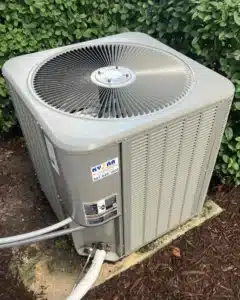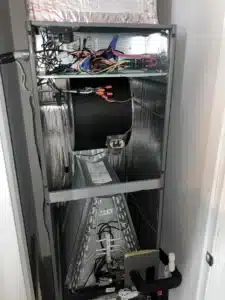What to Expect During a Professional HVAC Service Visit
For many Florida homeowners, scheduling HVAC service feels like a...
Living in Florida has its perks: beautiful beaches, warm weather, and plenty of sunshine. But the humid climate and constant battle against allergens can also pose challenges, especially when it comes to indoor air quality. Many people underestimate just how important clean indoor air is to their health. Here’s why paying attention to the air you breathe inside your home is crucial in the Sunshine State.
Before diving into the health benefits of good indoor air quality, it’s helpful to understand why maintaining clean air is particularly important in Florida. The state’s high humidity levels, frequent rainfall, and warm temperatures create a perfect environment for mold, mildew, and other pollutants to thrive. Pollen from the lush greenery and salt from the coastal air add to the mix, making it harder to keep indoor air fresh.
Air conditioning systems are often running year-round, which can also impact air quality. While they help control humidity and temperature, they can circulate dust, allergens, and even mold spores if not properly maintained. This is why addressing indoor air quality is not just about comfort but about protecting your overall well-being.
Breathing in polluted indoor air can have a range of negative effects on your health. The most obvious symptoms might be sneezing, itchy eyes, or coughing. But the impact can go much deeper. Long-term exposure to indoor air contaminants has been linked to serious health conditions, such as respiratory issues, cardiovascular disease, and even cancer. For people with asthma or allergies, poor air quality can make symptoms unbearable.
Children and the elderly are particularly vulnerable to pollutants. Kids’ lungs are still developing, and exposure to allergens or irritants at a young age can cause lifelong respiratory problems. Older adults often have weaker immune systems or pre-existing health conditions that make them more sensitive to airborne contaminants.
Indoor air pollution can also lead to fatigue and headaches. Even if you don’t have allergies or asthma, breathing in unhealthy air can make you feel sluggish or unfocused. A poorly ventilated home can trap odors, chemicals from cleaning products, and other irritants, further impacting your health and comfort.
Knowing what might be lurking in your home’s air is the first step toward improving indoor air quality. Here are some common pollutants that affect Florida residents:
Fortunately, there are effective ways to combat poor indoor air quality and create a healthier environment. Here are some strategies to consider:
Maintain Your HVAC System
Regular HVAC maintenance is crucial for keeping the air inside your home clean. Air conditioning units are the frontline defense against humidity, but dirty filters and neglected ducts can become a source of air pollution. Changing air filters every one to three months and scheduling annual tune-ups can make a significant difference. Consider having your ducts professionally cleaned to remove dust and allergens that have built up over time.
Use a Dehumidifier
Humidity control is essential in Florida. High humidity doesn’t just make your home feel uncomfortable; it also promotes mold growth. A whole-home dehumidifier can help maintain optimal humidity levels, typically between 30% and 50%, reducing the chances of mold and mildew taking hold. Your air conditioning system does dehumidify the air to some extent, but a dedicated dehumidifier provides extra protection.
Invest in Air Purifiers
Air purifiers with HEPA filters can capture particles like dust, pollen, and pet dander. Some purifiers also have activated carbon filters, which can remove odors and VOCs from the air. If you have severe allergies or asthma, consider placing air purifiers in the rooms where you spend the most time, such as bedrooms and living areas.
Improve Ventilation
Stale air can lead to a buildup of indoor pollutants, especially in homes designed to be energy-efficient and well-sealed. Opening windows on cooler days can help improve air circulation. Exhaust fans in bathrooms and kitchens are also useful for removing excess humidity and odors. For a more comprehensive approach, consider a whole-home ventilation system that brings in fresh outdoor air while filtering out contaminants.
Choose Low-VOC Products
When possible, opt for paints, finishes, and cleaning products labeled as low-VOC or VOC-free. These options release fewer harmful chemicals into your home, improving indoor air quality. Store cleaning supplies and other chemicals in well-ventilated areas or, better yet, in an outdoor shed to keep fumes from circulating indoors.
Keep Your Home Clean
Regular cleaning reduces the amount of dust and allergens in your home. Focus on high-traffic areas and spots where dust tends to accumulate, like carpets, curtains, and upholstered furniture. Use a vacuum with a HEPA filter to trap particles, and wash bedding and curtains regularly. Wiping down surfaces with a damp cloth can also help capture dust rather than sending it back into the air.
Improving indoor air quality isn’t just about avoiding health problems. It’s also about enhancing your quality of life. Clean air can make you feel more energized, reduce allergy symptoms, and promote better sleep. It can even improve your mental well-being. When your home’s air is fresh and healthy, you’ll notice a difference in how you feel day to day.
For families, better air quality means fewer sick days and doctor visits. Children will have an easier time breathing and concentrating on homework or play, and elderly family members will experience less strain on their respiratory systems. Even pets can benefit, as they’re often more susceptible to indoor pollutants than humans.
In Florida, where humidity and allergens are constant challenges, maintaining good indoor air quality should be a priority for every homeowner. The right HVAC system, combined with smart habits and regular maintenance, can make your home a healthier, more comfortable place. By taking action now, you’re investing in your family’s well-being and creating a safe sanctuary away from outdoor pollutants and allergens. Clean air isn’t just a luxury—it’s a necessity for healthy living.

For many Florida homeowners, scheduling HVAC service feels like a...

In a warm coastal climate like West Palm Beach, air...

Living in West Palm Beach means living with heat, humidity,...

Florida HVAC systems work harder than those in almost any...

Indoor air quality plays a major role in how a...

Ventilation is one of the most important yet often overlooked...